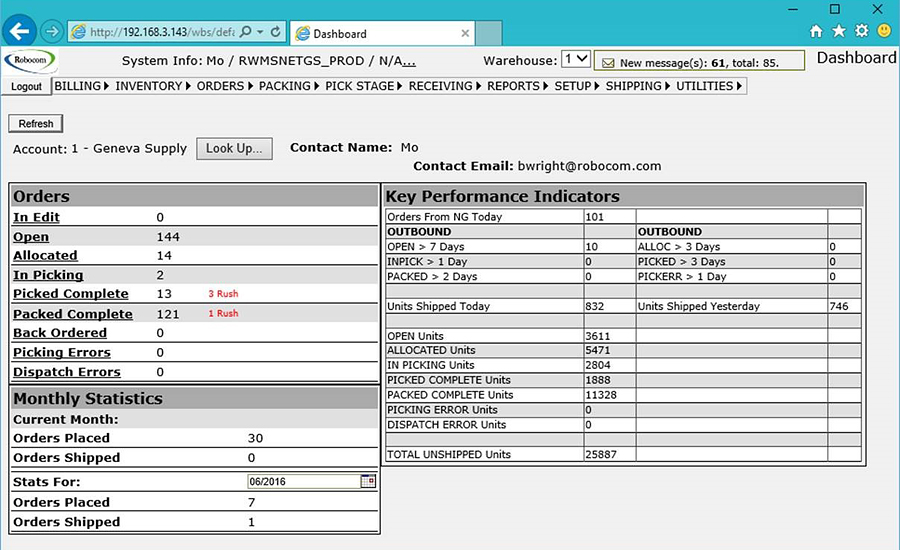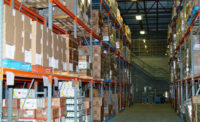Emerson Climate Technologies streamlines operations with WMS

Emerson Climate Technologies is a provider of heating, ventilation, air conditioning and refrigeration solutions for residential, industrial and commercial applications. Over the past decade, the Cudahy, Wis.-based company has experienced significant change associated with acquisitions, restructuring and the addition of new product lines.
Today, with the help of RIMS, a warehouse management system (WMS) from Robocom Systems International, Farmingdale, N.Y., Emerson Climate Technologies successfully manages the distribution process for 13 business units and four different product lines. Since implementing RIMS, which stands for Robocom’s inventory management system, the company realized dramatic business results, including a 57% increase in profits, a 20% increase in inventory accuracy and the ability to quickly and easily support the changing needs of the business.
Business limited by technology
Prior to implementing RIMS, almost all of Emerson Climate Technologies’ warehouse operations were performed manually. While the company maintained a legacy system for processing orders, procurement of its material and invoicing had to be manually entered by employees. Some of the company’s product lines also required that they capture serial numbers of the products that are shipped.
Operators had to physically go out into the warehouse with a piece of paper with the serial numbers and identify each one. The entire process was inefficient, time-consuming and tedious.
“In many cases, we were relying on our employees’ memories in order to locate items for picking,” says Rob Lee, operations manager for Emerson Climate Technologies. “It was certainly not a scalable way to manage our operations.”
Inventory management was also a significant issue for the company.
“We would show inventory on-hand, so we wouldn’t replenish our stock. Customers would order product, customer service would promise delivery and then we would go out to pick the order only to find that we didn’t have the product available. That was a major problem,” adds Don Richardson, manager of materials and IT for Emerson Climate Technologies.
A lack of visibility across operations was another challenge.
“There was just so much we didn’t know. We were so manual that we didn’t ask people to track how many lines they picked during the course of the day or how many locations they visited. Without real data to help us make decisions, we had to rely on a hunch or educated guess,” says Richardson.
The lack of automation and efficiency affected the team’s ability to support new opportunities.
“We had engaged with other Emerson divisions about doing distribution for them, but we weren’t in a position where we could handle that additional business,” adds Richardson. “We were spending all of our energy just trying to maintain our current level of activity vs being more strategic and trying to find ways to modify our operations to better support the needs of the business.”
Proven technology, industry expertise
Emerson Climate Technologies’ approach to choosing a solution was a true group effort, including input from customer service, materials and operations. With a list of 50 criteria, the company engaged six different technology providers and eventually narrowed the list down to three. After numerous meetings, demonstrations and talking with customer references from each vendor, the company selected Robocom and its RIMS system.
“Robocom had an extensive install base, so we knew the technology was proven. We felt that they would be a partner for us during this project, and would provide us the ongoing support we would need in the future,” says Richardson. “We also saw this as an opportunity to change some of our processes. With Robocom’s extensive knowledge and experience, we knew they could provide us with valuable insight into how we could modify our existing operations and processes in order to achieve significant improvements.”
Driving business results with RIMS
Since implementing RIMS, Emerson Climate Technologies’ warehouse operations had to rapidly adjust in response to new acquisitions and sales. At its peak, the company was shipping 50,000 lines a month.
“We literally could not have continued to grow our business and bring in other divisions without this system from Robocom,” says Lee. “We were almost brought to our knees because of the number of transactions we were doing. Prior to RIMS, we shipped about 25,000 lines a month on average and did about $190 million in business. Today, we’re in the neighborhood of around 35,000 lines and we are doing about $330 million in business.”
The business was given very little lead-time to accommodate for this growth. But, RIMS made the process fluid and simple.
“RIMS affords us the ability to quickly adjust our operations to meet the demands of the business,” adds Lee. “We can operationally scale up or down with relative ease, absorbing new business while keeping all of our processes under control. And, we have been able to do all of this without increasing the size of our warehouse because we are so organized and efficient.”
“Without RIMS, it would be virtually impossible to do what we are doing,” Richardson adds.“We would probably need 70 people on the floor 24/7 just to try and keep up with all of the transactions and the inaccuracies.”
Improved inventory management
Taking on new business also requires flexibility when it comes to managing inventory.
“Different businesses have different requirements when it comes to managing their inventory,” says Lee. “RIMS easily adapts to those changes, for example, enabling us to pick items based on pallets or pieces and manage the items at the bin level based on location type. We just configure the settings for each item in RIMS and the system takes care of the rest. Making set-up changes on the computer takes minutes and doesn’t require communication or putting in a bunch of overtime. At the point of receipt, RIMS begins directing activities with those new items to the new area or new set-ups. It is that simple.”
At any given time, Emerson Climate Technologies is managing between $8-9 million of inventory and 25,000 different SKUs, 12,000 of which are typically active. With the help of RIMS, the company has completely streamlined its inventory management process, increasing accuracy level by 20%. With increased visibility across its warehouse operations, the company is more accurate in its ability to plan and forecast.
“The system lets us know when we need to replenish our stock, not only based on existing orders, but [also] on likely future orders as well. That improves our efficiency levels and our ability to service our customers,” says Lee.
Increasing productivity and efficiency
RIMS has had a significant impact on Emerson Climate Technologies’ productivity and efficiency levels.
“[Since implementing RIMS], we have added just a handful of additional full-time jobs, but we have brought in $140 million of new business,” says Richardson. “As we have taken on the responsibility of managing the distribution for additional business units (within Emerson), we have not needed to add the additional head count we would have had to do in the past. So, these efficiencies have really given us the ability to take advantage of new opportunities and expand our business.”
Achieving visibility business-wide
Emerson Climate Technologies uses Robocom’s Crystal Reports module on a daily basis to monitor the business and make improvements.
“There is a ton of valuable information we are able to extract from the system and analyze in order to better understand our business and learn where we can make modifications to our operations to improve productivity,” says Lee.
For example, Emerson Climate Technologies looks at information about the operators in terms of what their capabilities are on a day-in and day-out basis. They then measure that data across the board, so they can continually make changes to improve productivity levels.
Flexibility and agility to support change
The flexibility of RIMS has enabled Emerson Climate Technologies to quickly and easily adapt to change.
“For example, whenever we introduce a new product to the facility, all we need to do is understand where we want to put it and if we need to move product from one area to another area; the change is essentially seamless,” Richardson says.“In the past, if we wanted to create or free up an area, we would need to set up a rack or do something new. We would literally have to schedule a weekend and bring in overtime help. Today with RIMS, making this kind of change is easy and our costs are significantly reduced.”
The company is constantly looking for ways to improve efficiencies and introduce greater automation across its operations. That’s why it introduced a cubic scanner to gather weight and dimension information on every item.
“Our IT guys were able to quickly and easily interface the system with RIMS,” says Lee. “Now, at the point of receipt, RIMS automatically tells the receiver if the item needs to be cubed and weighed. They take it to the scanner and the information is captured in RIMS. This is incredibly valuable information that enables us to be far more accurate with our shipping process.”
In the near future, Emerson Climate Technologies plans to introduce an inline weight scale for its small parts section to eliminate some audit features and improve quality control. The company also wants to introduce voice picking and a vertical carousel to streamline operations by bringing the parts to the workers vs the other way around.
“Our goal will be to interface RIMS with any other third-party system we choose,” says Lee.
Maintaining a competitive edge
The move to RIMS has provided Emerson Climate Technologies’ customers with numerous benefits. Prior to using the system, the company didn’t offer an advance shipping notice (ASN). Today, customers are notified when the company has shipped an order and they know exactly what they will receive. And, customers are able to place orders via a portal, which are automatically sent to the RIMS system.
“We had one customer enter an order through the portal, and within 20 minutes, he called us shocked when he received his ASN. Within that time, we had that product picked, packed and sitting on a dock ready for the carrier to come in for pickup,” says Richardson.
Competition in the industry is growing, particularly from international players.
“One way were are looking to keep an edge is by providing our customers with a complete solution for managing their entire supply chain,” says Lee.” The more services and features we can provide, the more competitive we will be. Speed to market is critical. Prior to RIMS, we needed a 10-day lead-time; now we are down to two days, and we are shipping 150-200 same-day shipment orders daily. This speed to market is a clear differentiator for us.”
Emerson Climate Technologies plans to continue growing its business, and the WMS system, in conjunction with new automation technologies, will ensure it can accommodate future growth and remain competitive.
Looking for a reprint of this article?
From high-res PDFs to custom plaques, order your copy today!






